Episodes
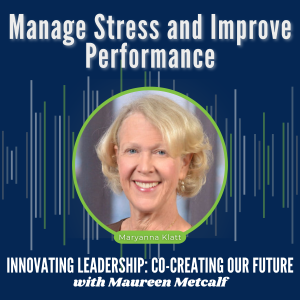
Wednesday Mar 15, 2023
Wednesday Mar 15, 2023
Guest: Maryanna Klatt
Maryanna Klatt is an accomplished researcher looking at the connection of mindfulness and performance across multiple populations and organizations. The interview focuses on Maryanna’s work with mindfulness based interventions and how leaders can use them to improve their effectiveness and encourage their organizations to use it to impact work groups beyond the impact on individual leaders. This concept is particularly important in helping leaders manage the stress associated with the volume of change organizations are currently facing and that leaders are responsible to anticipate and manage. Maryanna’s work is highly research based – Her program, “Mindfulness in Motion” is an evidenced –based approach to stress reduction in the workplace. Topics include:
1. Maryanna’s research findings.
2. Discussing specifics of what mindfulness is and how leaders can use as well as the results they can expect.
3. Balancing mindfulness practices to reduce stress and improve performance while minimizing time invested in the practice.
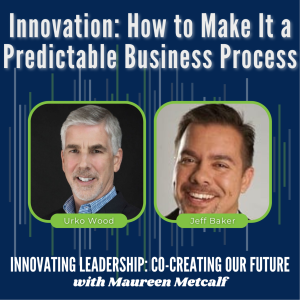
Wednesday Mar 15, 2023
Wednesday Mar 15, 2023
Guests: Urko Wood and Jeff Baker
In this show, we will explore what innovation really is, and is not, and bust some common myths. Listen in to learn how you can make innovation and growth a predictable and profitable business process.Maureen, Urko, and Jeff will discuss:1. What is the innovation process?2. What makes it predictable?3. What are the biggest myths you want to dispel during this conversation?4. Why are some companies better at innovation than others?5 What do you see is the biggest impediment to innovation in organizations today?6. Is leadership itself ever an impediment to innovation?7. How can companies build a culture of innovation?
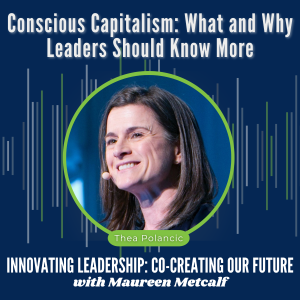
Wednesday Mar 15, 2023
Wednesday Mar 15, 2023
Guest: Thea Polancic
People start businesses to make a difference in the world. They have an impulse to solve a need. Over time they can move toward profit generation and protection.Conscious Capitalism is about returning to the roots of doing something that matters. There are more and more people starting businesses because they want to do something that matters to them. This is a movement/philosophy that allows businesses to transform.It is business 2.0. What we relied on for competitive advantage is no longer sufficient. Your purpose and values are the things they can’t copy and paste. We are also unapologetically profit motivated.
Thea and Maureen discuss:1. the four pillars of conscious capitalism2. what does personal conscious capitalism look like3. what concrete actions individuals can take to get started4. what concrete actions organizations can take to get started
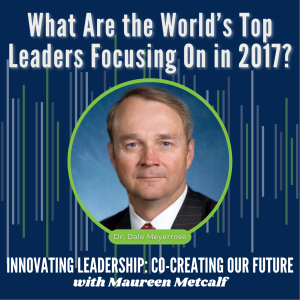
Wednesday Mar 15, 2023
Wednesday Mar 15, 2023
Guest: Dr. Dale Meyerrose
Over the past two years, Maureen conducted 100 weekly interviews with top executives, academics, consultants, and diplomats from around the globe. For the 100th anniversary, she synthesizes the key themes and summarizes key learning during these interviews. This interview focuses on what top thinkers and leaders are focusing on. They continue to build their own inner capacity to deal with life’s challenges, they are staying current on a broad range of topics that impact their organizations from technology to geopolitics and they are focusing on evolving their organizations to remain successful as the ecosystem in which they operate continually changes. One of the most important take-away’s is that while we are facing unprecedented challenge, there are amazing people thinking about these issues and experimenting with solutions to solve our biggest challenges.
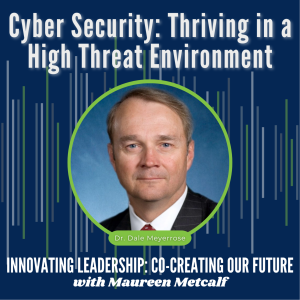
Wednesday Mar 15, 2023
Wednesday Mar 15, 2023
Guest: Dr. Dale Meyerrose
Leaders will better understand the nature of the threats we currently face and how to take proactive steps to optimize organizational success by taking advantage of the cloud and at the same time protect organization’s critical to position to run efficient and effective organizations. During this show, Maureen Metcalf and Dr. Dale Meyerrose discuss several questions raised by an executive forum to provide a perspective from senior leaders: 1. Overview of the cyber security landscape – what is real and what is hype? 2. Address specific questions from the executive forum members about cyber security. 3. What should leaders and boards be thinking with regard to cyber security? This session provides listeners with a strong foundation to understand and plan their next steps required to keep their organizations operations and data safe.
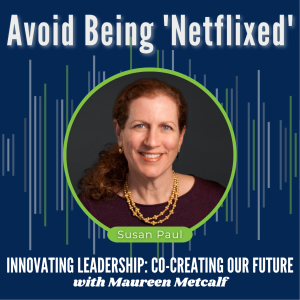
Wednesday Mar 15, 2023
Wednesday Mar 15, 2023
Guest: Susan Paul
With the increasing pace of change in IT, what do you need to do with IT to avoid being ‘Netflixed’?
Susan will share her perspective on several questions1. What disruption do you see being caused by technology over the next 5 years?2. What do you recommend organizations DO to address this disruption?
IT change is going to continue at an increased pace and increased cost. You need to think through and have a strategy for managing that change so it doesn’t catch you flatfooted. Your IT strategy goes well beyond the IT organization itself – because of the depth and breadth of technology you have and will be implementing, the organization needs to look at IT and technology spend as a key component of their business strategy.

Wednesday Mar 15, 2023
Wednesday Mar 15, 2023
Guest: Guru Vasudeva
As a CIO with Nationwide, Guru Vasudeva shares his extensive experience with implementing lean and agile practices across a large IT organization. He shares his challenges, recommendations and financial and quality results. He answers the following questions: 1. Does lean only apply to operations? 2. What results has Nationwide been able to achieve through Lean IT? 3. As a CIO – how have you changed your leadership style to run an organization that is using lean and agile? 4. How does lean relate to innovation? 5. What advice you have for CIOs who are embarking on a Lean transformation?
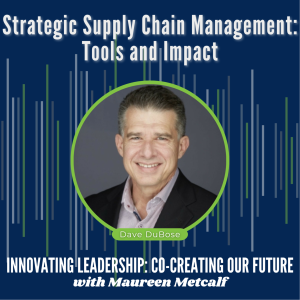
Wednesday Mar 15, 2023
Wednesday Mar 15, 2023
Guest: Dave DuBose
Dave and Maureen discuss Dave's experience with supply chain optimization and talk about what leaders should be thinking about with regard to how effective supply chain management contributes to accomplishing overall organizational strategy. When done well it is cost effective and attracts limited attention. When done poorly, it damages company’s reputations. Dave will share his experiences of strategic solutions and pitfalls.
Topics include:1. What role does supply chain play in business? In society?2. What trends are you seeing in supply chain work and how will it change the supply chain practice in the next few years?3. What are common business issues that companies face in supply chain optimization?4. What innovative solutions should companies be considering?
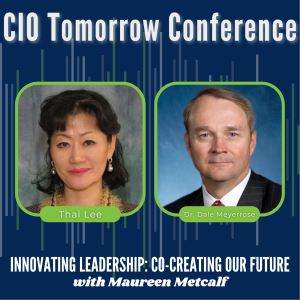
Wednesday Mar 15, 2023
Wednesday Mar 15, 2023
Guests: Thai Lee & Dr. Dale Meyerrose
This interview is recorded live at the CIO Tomorrow Conference on April 14, 2016. It includes conversations with two keynote speakers – Thai Lee and Dr. Dale Meyerrose talking about disruptions in the technology industry and their views on how to run organizations that will thrive in and era of rapid disruptive changes. In early 2015, Fortune magazine sent a survey to each of the Fortune 500 CEO’s, asking in part what their companies saw as their greatest challenge. Not surprisingly, the largest response was the rapid and disruptive pace of technological change. Those CEOs knew that disruption creates pivotal points at which normal patterns can no longer reasonably be maintained. Their concerns about how these new advancements will impact the future expectations of their companies, both from a capabilities and a consumer point of view, are important perspectives worthy of serious consideration. Change is a choice, not a mandate. Organizational health is driven by this choice.
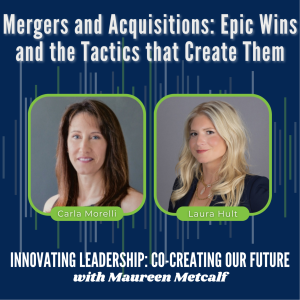
Wednesday Mar 15, 2023
Wednesday Mar 15, 2023
Guests: Carla Morelli & Laura Hult
Carla Morelli and Laura Hult talk about mergers and acquisitions focusing on key factors that drive success and failure. They are seasoned M&A veterans, participating in many transactions and both have seen similar themes. This interview provides insights and recommendations to improve the probability of success for your next transaction – whether you are acquiring, selling or involved in the integrations. 50% – 80% of acquisitions fail to deliver intended results. We will explore key success factors: 1. Understanding the deal goals – the why of the transaction for both sides; 2. Working with the human factors that have the greatest impact (and M&A transactions fail without considering humans and dealing with their needs); 3. Navigating the organizational factors. The participants share their stories of success and their unique perspectives.
Mergers & Acquisitions: Five Key Drivers to Deliver Value
Not a well-understood concept here..
Today’s post is a collaboration between Maureen Metcalf, Carla Morelli, and Laura Hult, focusing on mergers and acquisitions (M&A) and identifying key factors that drive success and failure. The post is a companion to a podcast with the authors. They are seasoned veterans who have participated in many transactions and seen similar themes. This post and its companion podcast provide insights and make recommendations to improve the probability of success for your next transaction, whether you are acquiring, selling, or involved in the integration.
Research Indicates that Mergers and Acquisitions Often Fail to Deliver Desired Results
The Financial Times Press’ A Comprehensive Guide to Mergers & Acquisitions: Managing the Critical Success Factors Across Every Stage of the M&A Process says that though studies have historically set the rate of M&A failure at 50 percent or more, recent years have found it to be as high as 83 percent. One might conclude that executives and boards would eschew M&A to achieve growth and profitability in favor of less risky alternatives, but that has not been the case. Despite the warning signs, the number and dollar value of transactions has increased yearly for the last 20 years.
Failure Results from Management’s Lack of Knowledge or Unwillingness to Face Facts
“The primary reasons for failures [are] related to the fact that it is easy to buy but hard to perform an M&A. In general, many mergers and acquisitions are characterized by a lack of planning, limited synergies, differences in the management/organizational/international culture, negotiation mistakes, and difficulties in the implementation of the strategy following the choice of an incorrect integration approach on the part of the merging organizations after the agreement is signed. Most failure factors indicate a lack of knowledge among senior managers for the management tools that enable coping with the known problems of M&A.” Another management shortcoming is an unwillingness to accept information that negatively impacts post-close projections, whether it be market data, synergies, or cultural challenges. Deal teams often find themselves looking for creative ways to meet expectations. Not meaning to mislead, they are still well aware that the scenarios being modeled are more than just a stretch. The post-close result often falls far short of the mark.
Human Factors are Among the Most Important to Consider
Human factors almost always significantly impact a deal’s success and the amount of additional cost and effort required to recover when they were not sufficiently considered. The five human factors below differentiate successful deals:
Understand the “why.” The buyer and the seller need a clear understanding of why they are initially engaging in the transaction (referred to as the rudder), such as ensuring the business moves forward when a founder retires. As the deal progresses, use the rudder and be open to refining the “why” as the deal unfolds, like realizing that another key motivation is the well-being of employees who helped build the company.
Select an advisory team for both skill and philosophical fit. Advisors play a key role in the deal’s success, and their approach is as important as their skills are. A competent, “bulldog” attorney who takes no prisoners and is more adversarial than the buyer wants to be, for example, is likely to generate wariness and ill will on the seller’s part, eroding the trust and open communication that enables thorough diligence and comprehensive, realistic integration planning. In addition to the advisory team, engage someone to be a sounding board for critical decisions, which can step back when other participants lose their objectivity.
Maintain resilience. The M&A process is physically and emotionally exhausting. To ensure enough physical energy and mental clarity to make tough decisions, buyers and sellers must manage their energy and find ways to rejuvenate. This will be different for different people but should include making conscious choices about physical well-being, managing one’s emotional state, managing thinking (remaining positive), and looking to a trusted advisor for support.
Build trust among the team. Trust takes time and energy when both are scarce. It is particularly important to create an atmosphere that allows people to constructively deal with negative information rather than “creatively” work around it. If the team is selected based on skills and mindsets that align well (similar values and overall approach), it can work through most issues. Addressing them quickly and openly is critical to sustaining a strong team, which is required when challenges arise – and they always do.
Proactively plan and manage the integration. Value is only realized when the organizations are successfully integrated. The most successful integrations have cross-functional integration teams comprised of representatives from both organizations. In addition to keeping the team aligned via regular meetings, progress should be reported at the highest appropriate organizational level (from steering committees to boards of directors, depending on the company's size and transaction) on a cadence that provides visibility and a forum for decision-making when needed.
Managing human factors increases the likelihood of value being realized: people are complicated, and building a team that has the capacity and inclination to attend to them is a differentiator in an industry where many still focus on the technical elements of the deal.
About the Authors
Maureen Metcalf, Founder and CEO of ILI, is an executive advisor, speaker, coach, and author of an award-winning book series focused on innovating how you lead. She is also on the faculty of universities in the US and Germany.
Laura Hult works as an outside counsel focusing on corporate finance. She represents private equity funds and financial, strategic, and lifestyle companies as buyers and sellers. Laura structures negotiates and protects investment value in M&A transactions and has represented investors and lenders at every level of the capital stack.
Carla Morelli is a leader who steers people and organizations through complex change, including global M&A transactions. She delivers business-critical results that balance structural needs with human inter-dynamics; her ability to integrate multiple perspectives and mesh the “balcony view” with a detailed understanding of what is required for an initiative to succeed consistently unlocks potential where other approaches have failed.
Reference:
Weber, Yaakov; Oberg, Christina; Tabra, Shlomo. (January 2014), The M&A Paradox: Factors of Success and Failure in Mergers and Acquisitions, Financial Times Press
